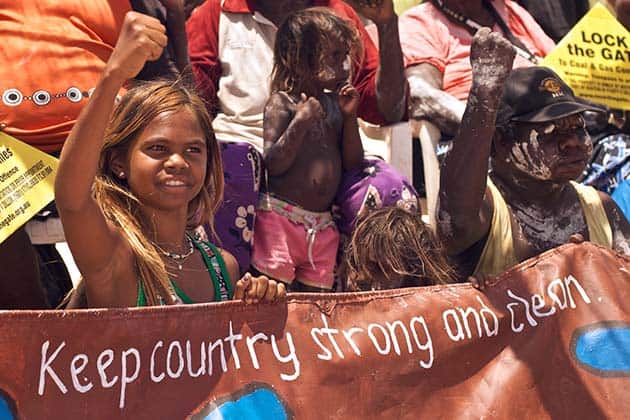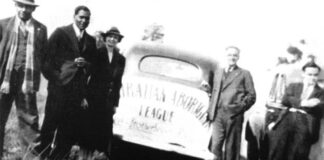Aboriginal people living in Borroloola and the surrounding homeland communities in the Northern Territory have fought against the destruction of their lands by the mining industry for generations.
In 2007, there were fierce protests against the decision to allow for the diversion of the MacArthur River to facilitate a massive expansion of the MacArthur River Zinc mine owned by Glencore. This mine has poisoned the river. Spot fires caused by chemical reactions in the mine’s waste rock dump site produce noxious sulphur fumes which continue to make people sick.
Consistent mobilisation by the community forced a halt to mine operations last year while the company drew up plans to deal with the crisis. Against the demands of their own Environmental Protection Agency, the Northern Territory Government issued a temporary license to continue mining after the company encased the waste rock in clay, a band-aid measure that has failed on similar projects around the world. The community is pushing for immediate closure while demanding the retention of local jobs, and the creation of new ones, for a long process of remediating the mine site, a plan that has met with a positive response from NT trade unions. This campaign has continued despite intimidation and blackmail from Glencore, who fund many of the vital services in Borroloola, in the context of the NT Intervention, where governments have increased controls while withdrawing funding from Indigenous communities in an attempt to force people off their lands.
In the last few years, a new threat has emerged, with exploration licenses being issued throughout the region for unconventional gas that would be exploited through fracking.
Padraic Gibson spoke to three young leaders from the region, Scott McDinny, Nicholas Fitzpatrick and Conrad Rory, who had travelled to Sydney to attend a conference organised by Indigenous Climate Youth Network SEED.
What is driving you in your fight to protect your land?
Conrad: We are carrying on the fight of our three great-grandfathers. We looked up to them, they passed their knowledge of the country down to us. The songlines, how to live in the bush, how to hunt. Which places to go and which places not to go. They have been looking after the country for a long time. It’s our sacred duty to keep up that legacy.
Scott: We have stories, songs and dances that connects us through the land that we live on. That’s what drives us to fight. It was put in to my Nanna’s heart and Grandfather’s heart by their Grandparents. Now it’s on to us. It’s our responsibility.
Conrad: We have grown up seeing the mine destroy our country. We used to go to the river crossing every afternoon after school. Fresh water would flow down and the salt water would push it back up with the incoming tide.
There would be Barramundi, boney bream, we’d literally sit at the crossing waiting for the fish to swim upstream and just grab them, no need for a fishing line. You can’t do that anymore. They flow of the river has been completely changed by the diversion. The companies come in, try and play mother nature and destroy everything. They say it’s good for the economy—but whose economy?
Scott: The river is dead now. Even if there is remediation work done it will take a long time to heal itself. We’ve had doctors come down from Darwin and tell us, because of the heavy metals in the river, we are only allowed to eat a handful of fish. I don’t want to just eat a handful. I want to do as my people have always done, eat the whole fish and burn the bones so that the spirit of the fish is sent back to the river.
Talk about the threat of fracking and the actions you are taking to try and stop it. I know you have led strong mobilisations that have been joined by people from across the targeted areas and NT Unions have now affiliated to an international group, “Unions against fracking”.
Conrad: Gas exploration companies have been given approvals over 85 per cent of the NT and that includes most of our region. They want to build a major pipeline to send the gas interstate. We fought off attempts to build the pipeline through the Gulf, now they want one to run through the Barkly, from Tennant Creek to Mt Isa. We have attended conferences and heard about the destructive effects on other communities from all over the world.
Nicholas: There have been some big protests, up in Darwin and recently in Katherine. CAAMA [Aboriginal community radio] was covering that march and got phone calls from Aboriginal people right across Australia whose lands are also under threat. They were thinking, “we are alone facing this”, now they can see it’s possible to stop it. We even got support from other Indigenous people from around the world. This is the year we can make a change.
Conrad: We also know fracking will only make climate change worse, that’s why we are here with SEED, a young Indigenous group fighting climate change. We are out making connections, building support.
Nicholas: The climate is changing too fast. I was always a keen young fella for asking a million questions of old people. My grandfather lived on the Vandalin islands his whole life. He would talk about the changes that were happening, that the tides and sand movements were becoming unpredictable. The weather too, is no longer predictable, we have seasons starting early, things that happen within the season that should not happen, storms coming at the wrong time, or not at all.
If you are rejecting this fracking and mining, what do you want to see on the lands?
Scott: We want to see people back on their land. We don’t want to be reliant on mining companies. When the homelands are occupied, with Indigenous ranger programs operating, if they are run properly, if the land is burnt properly, looked after properly, then the land can come to life again.
We get so much sunlight every year. Right now homelands struggle for reliable power, rely on traveling to fill up jerry cans for diesel generators. Solar systems could easily power remote communities, people can go back and maintain the balance of life. Even towns like Katherine could be completely powered by solar.
Nicholas: On the flat country, the tableland country, we have a lot of wind too. We could have wind turbines to power our communities also. We’d be laughing, we could send power to other places. There’s lots of opportunities for agriculture, for eco-tourism, but the people need to be on the land.
Conrad: The governments, the mining companies, they only care about money. They sit in their offices and do deals, make approvals, they don’t care about the people on the ground, they are willing to kill us off, they don’t care. The only thing that can stop them is people power—and the more people we have in this movement, the more power we will have to make a change.






